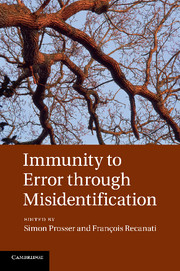Book contents
- Immunity to Error through Misidentification
- Immunity to Error through Misidentification
- Copyright page
- Contents
- Contributors
- Preface
- Chapter 1 On the thesis that ‘I’ is not a referring term
- Chapter 2 Which ‘key to all mythologies’ about the self ? A note on where the illusions of transcendence come from and how to resist them
- Chapter 3 Two takes on the de se
- Chapter 4 Immunity to error as an artefact of transition between representational media
- Chapter 5 Two uses of ‘I’ as subject?
- Chapter 6 Immunity to error through misidentification: what does it tell us about the de se?
- Chapter 7 Action and immunity to error through misidentification
- Chapter 8 Explaining de se phenomena
- Chapter 9 Sources of immunity to error through misidentification
- Chapter 10 Immunity to error through misidentification: what it is and where it comes from
- Chapter 11 I and I: immunity to error through misidentification of the subject
- Chapter 12 Bodily immunity to error
- Chapter 13 Reflections on François Recanati's ‘Immunity to error through misidentification: what it is and where it comes from’
- Bibliography
- Index
Chapter 10 - Immunity to error through misidentification: what it is and where it comes from
Published online by Cambridge University Press: 05 May 2012
- Immunity to Error through Misidentification
- Immunity to Error through Misidentification
- Copyright page
- Contents
- Contributors
- Preface
- Chapter 1 On the thesis that ‘I’ is not a referring term
- Chapter 2 Which ‘key to all mythologies’ about the self ? A note on where the illusions of transcendence come from and how to resist them
- Chapter 3 Two takes on the de se
- Chapter 4 Immunity to error as an artefact of transition between representational media
- Chapter 5 Two uses of ‘I’ as subject?
- Chapter 6 Immunity to error through misidentification: what does it tell us about the de se?
- Chapter 7 Action and immunity to error through misidentification
- Chapter 8 Explaining de se phenomena
- Chapter 9 Sources of immunity to error through misidentification
- Chapter 10 Immunity to error through misidentification: what it is and where it comes from
- Chapter 11 I and I: immunity to error through misidentification of the subject
- Chapter 12 Bodily immunity to error
- Chapter 13 Reflections on François Recanati's ‘Immunity to error through misidentification: what it is and where it comes from’
- Bibliography
- Index
Summary
Keywords
- Type
- Chapter
- Information
- Immunity to Error through MisidentificationNew Essays, pp. 180 - 201Publisher: Cambridge University PressPrint publication year: 2012
- 40
- Cited by

